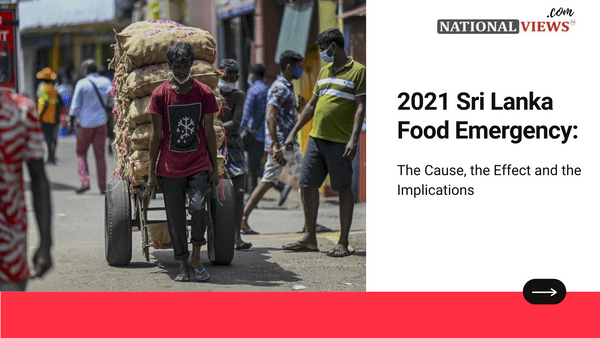With Sri Lanka suffering a trenchant economic crisis, the President has ordered food emergency regulations in the country countering the hoarding of many essential food items. The Sri Lanka Food emergency comes after the country has been running out of money to pay for imports and the private banks are fast running out of foreign exchange to finance imports.
The Cause of 2021 Sri Lanka Food Emergency: The Debt Crisis
The island nation has been in financial trouble much before the Covid-19 pandemic. Apart from massive borrowing from various foreign sources, Sri Lanka has foreign debt issues which lead to BOP (Balance of Payment) problems. The root causes of the current economic crisis are its structural weakness including low tax revenue, contraction of trade and the lack of FDI. Besides, for the last 40 years, the country has been relying on foreign loans heavily for its development purposes.
Although the foreign-debt to GDP ratio started declining in 2014 and reached to 30% figure it has been rising post taking loans from China and finances from ISBs (commercial borrowing with high interest and short payback period of 5 to 10 years). In 2017, the country was forced to hand over its strategic Hambantota port on a 99-year lease to a Chinese company after it failed to service the $1.4 billion debt from Beijing that was used to construct it.
Now that FDI flow remains low in Sri Lanka (The tourism industry too got affected in a pandemic) and the foreign currency outflow has been growing tremendously due to ISBs and other loans, foreign currency inflow didn’t see any considerable improvement.
This escalating mismatch between Forex inflow and Forex outflow caused the precarious forex crisis in Sri Lanka – making foreign reserves run dry and complicating political as well as macroeconomic issues including its international trade and investment. Moreover, with the steep fall in the value of the Sri Lankan rupees (7.5% fall against the US Dollars), there is an increase in food prices due to the shortage and increasing surge in the cost of basic items.
Also Read: Weather As Weapon: How China’s Weather Modification Project Tianhe Be a Threat to India?
Forex Crisis, Economy Crisis and the Effect of Food Emergency Imposed in Sri Lanka
In an attempt to control the rising inflation, the authorities have taken control of the supply of basic food items including sugar, rice and other essential items. The government has authorised officers to take necessary steps to make available essential food items to the public at a concessionary rate by acquiring stocks of essential items.
The government has even appointed a former army general as the Commissioner of essential services and given them the power to control and seize stocks held by retailers and traders. The move however followed an increase in the price of potatoes, onion, sugar and rice, while huge queues have formed outside stores because of shortages of kerosene, cooking gas and milk powder despite the island nation being under a 16-day curfew due to Covid-19 cases.
In its attempt to buy essential vaccines and medicines, the energy minister has even appealed to motorists to use fuel judiciously. If not, there is a growing presumption that fuel rationing will soon be introduced in the country. Besides, the Central Bank has increased interest rates in a bid to shore up the local currency as importers are unable to source dollars to pay for medicines and food they are allowed to buy and
Meanwhile, all the food items will be provided at government-guaranteed prices or based on the customs value of imported goods to prevent market irregularities. The government also amplified penalties for food hoarding but the deficiencies come as the nation of 21m battles a ferocious Covid-19 wave that is claiming several deaths on a daily basis.
The Implications
The economic crisis along with the Sri Lanka food emergency seems to be very worrisome than it was in the 90s and the debt situation seems to be highly deteriorating. The possible sustainable thing for Sri Lanka currently and going forward is to address the structural weakness. However, the problems aren’t going to go away soon at least not till 2030 as the island nation will have outstanding ISBs till then.
Besides, the government has to work towards the prevention of social, political and health crises in the country. The revival and strengthening of producers, consumers and cooperatives is the only way out but it won’t be easy.


